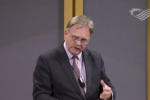
Speaking in today’s Senedd Debate on Universal Basic income (UBI), North Wales MS Mark Isherwood stated that “reducing the amount of people living in Poverty in Wales cannot be solved by one action” and called on the Welsh Government to instead tackle poverty more widely, “with citizen involvement at its core”.
Responding to the Motion’s calls for ‘the Welsh Government to establish a UBI trial in Wales’ and ‘to lobby the UK Government for funding to establish a Wales-wide UBI’, Mr Isherwood highlighted the many concerns that have been raised regarding a UBI by various organisations, and referred to the statement by UK Secretary of State for Business, Alok Sharma that “universal basic income is an issue that’s being tested in other countries and hasn’t been taken forward.”
Taking part in the hybrid Plenary meeting of the Welsh Parliament from his home in North Wales, Mr Isherwood said:
“Universal Basic Income has gained significant recent interest. However, as the Bevan Foundation state, ‘as with many schemes that affect people’s income, the design and value of the proposals really matter’.
“They found that although a ‘UBI would help to reach people currently outside the benefit system and could reduce stigma, … people have significant differences in needs. These are unlikely to be met by even a high rate of UBI’ and ‘most studies show UBI has only limited effects overall on peoples engagement with the labour market’.
“They also ask ‘whether a high rate of UBI would be so expensive that it is difficult to invest in other essential services such as the construction of new social housing and the provision of more low cost public transport’.
“The Centre for Social Justice’s Report ‘Universal Basic Income An Effective Policy for Poverty Reduction?’ also argued that UBI is unaffordable, putting at risk the provision of important services in healthcare and education, adding that it: Doesn’t meet the needs of low income households facing complex problems such as drug addiction, dangerous debt, and family breakdown; Provides a major disincentive to find work; And is no more generous to the most disadvantaged households than the provisions under Universal Credit.”
Mr Isherwood added:
“Last year, the Finnish Government did not proceed with UBI, after a two year trial, concluding that it failed to help unemployed people re-join the workforce. Although a form of UBI is in place in Alaska, the level of payment is not sufficient to replace people’s income and therefore acts as a supplement – and although Spain has recently introduced a minimum income scheme, it appears to have more in common with the UK’s social security system than the version of UBI being debated.
“Reducing the amount of people living in Poverty in Wales cannot be solved by one action. The Bevan Foundation calls for the development of ‘an anti-poverty strategy that clearly sets the steps that the Welsh Government intend to take to reduce the number of people living in poverty in Wales’.
“As Oxfam Cymru states ‘It’s not the case that anti-poverty strategies don’t work; it’s about how those strategies are targeted’. The Bevan Foundation has recently called for ‘the Welsh Government to encourage local authorities to establish a single point of access for Free School Meals, the Pupil Development Grant Access and the Council Tax Reduction Scheme’, stating ‘This would make it easier for families in poverty to access them. Where possible this support should be provided on a ‘passported’ basis’. And as NEA Cymru states ‘the Welsh Government should designate fuel poverty as an infrastructure priority’.
“Prevention is vital if people and organisations in Wales are going to address the major challenges we face - taking practical action to stop problems arising in the first place. Sticking plasters are just not enough – we need to find the underlying causes and do something to address them.
“If people keep falling into a river, would it not be better to build a fence upstream to stop them falling in rather than endlessly rescuing them before they drown?
“As the Joseph Rowntree Foundation noted in 2018, Universal Basic Income ‘is not affordable, unpalatable to most of the public because of its ‘money for nothing’ tag and perhaps most importantly – it increases poverty unless modified beyond recognition’.
“Tackling poverty more widely will only succeed with citizen involvement at its core. We now need words turned into real action, doing things with people, rather than to them, at last. We need to fully embrace Co-production, moving beyond rhetoric and consultation to doing things differently in practice, with service professionals, services users and their communities working side by side to provide solutions.”
